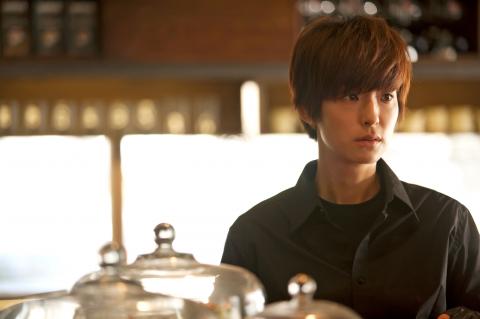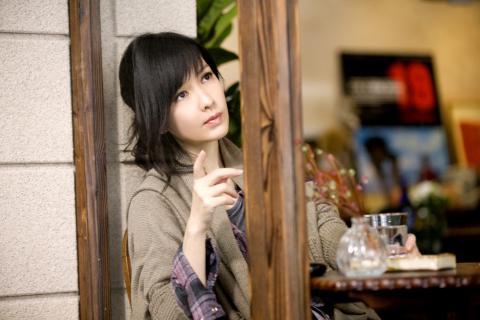Three years after his record-breaking debut feature You Are the Apple of My Eye (那些年,我們一起追的女孩), best-selling writer and director Jiubadao (九把刀 or “Nine Knives,” real name Giddens Ko, 柯景騰) returns with Cafe. Waiting. Love (等一個人咖啡), a romantic comedy based on his novel of the same title. This time, however, Jiubadao’s working partner Chiang Chin-lin (江金霖) is in the director’s seat and supported by big-shot producer Angie Chai (柴智屏). The movie rounds out nicely with an appealing cast of novices and veterans, including Hong Kong’s former pop diva Vivian Chow (周慧敏) as a guest performer.
Billed as the second installment of Jiubadao’s love trilogy, the highly anticipated film brings an entertaining mixture of zany slapstick and manga-esque humor, but lacks the youthful spark and ingenuity that made its predecessor shine.
The film begins with Siying (Vivian Sung, 宋芸樺), a loud, outspoken college girl who is almost hit by a bus. Believing Zeyu (Marcus Chang, 張立昂) is the man who saved her from death, Siying follows the mysterious and gentle young man to Cafe. Waiting. Love, a coffee shop managed by tomboy barista Abusi (Megan Lai, 賴雅妍). She applies for a job and is hired by the beautiful, melancholy owner (Vivian Chow, 周慧敏).

Photo courtesy of Amazing Film Studio
Siying spends most of her time harboring a secret crush on Zeyu until she meets the goofy and upbeat A-Tuo (Bruce, 布魯斯), who attends the same college as her. Standing up to defend A-Tuo when he is teased by his buddies for losing his girlfriend to Abusi, Siying impresses A-Tuo, and the two soon become good friends.
A-Tuo, who works various part-time jobs to save money to travel, introduces Siying to a motley group of characters such as film director-turned-gangster mediator Brother Bao (Lee Luo, 李王羅) and sexy Auntie Jindao (Paulien Lan, 藍心湄). Together, the two have great fun, but Siying takes no notice of A-Tuo’s growing affection for her.
It isn’t until Siying confesses her love to Zeyu and discovers his secret that she realizes her heart belongs to A-Tuo, who is on his way to Africa.

Photo courtesy of Amazing Film Studio
Co-produced and written by Jiubadao, the film is packed with juvenile fun and surprise plot twists which, not to give the story away, involve supernatural powers and a couple of ghosts. As in You Are the Apple of My Eye, which discovered new talent Ko Chen-tung (柯震東) and propelled Michelle Chen (陳妍希) into the limelight, Jiubadao and his crew know how to pick their cast.
Newbie actors Vivian Sung and Bruce both appear natural and relaxed in their roles, sharing electrifying chemistry on the screen. Having gradually withdrawn from the public eye in recent years, Vivian Chow simply delights with her rare, elegant presence. Worth a special mention is Lai’s relatively quiet performance as the tomboy lesbian.
At two hours, the film could have used some pruning. While fueling the story with much needed dramatic tension and slapstick humor, the subplots involving Brother Bao and Auntie Jindao as well as Vivian Chow’s character appear not fully integrated into the story, rending the film less focused and structured. Jokes and characters are sometimes more stereotypical than organic, short of sparks to bring them to live.

Photo courtesy of Amazing Film Studio
Slated to open simultaneously in Taiwan and Hong Kong today, Cafe. Waiting. Love is expected to become a summer blockbuster, following the tremendous success of You Are the Apple of My Eye, which passed the previous record of HK$61 million (US$7.93 million) in 2011 to become the highest-grossing Chinese-language movie in Hong Kong’s history.

This month the government ordered a one-year block of Xiaohongshu (小紅書) or Rednote, a Chinese social media platform with more than 3 million users in Taiwan. The government pointed to widespread fraud activity on the platform, along with cybersecurity failures. Officials said that they had reached out to the company and asked it to change. However, they received no response. The pro-China parties, the Chinese Nationalist Party (KMT) and Taiwan People’s Party (TPP), immediately swung into action, denouncing the ban as an attack on free speech. This “free speech” claim was then echoed by the People’s Republic of China (PRC),

Exceptions to the rule are sometimes revealing. For a brief few years, there was an emerging ideological split between the Democratic Progressive Party (DPP) and Chinese Nationalist Party (KMT) that appeared to be pushing the DPP in a direction that would be considered more liberal, and the KMT more conservative. In the previous column, “The KMT-DPP’s bureaucrat-led developmental state” (Dec. 11, page 12), we examined how Taiwan’s democratic system developed, and how both the two main parties largely accepted a similar consensus on how Taiwan should be run domestically and did not split along the left-right lines more familiar in

Specialty sandwiches loaded with the contents of an entire charcuterie board, overflowing with sauces, creams and all manner of creative add-ons, is perhaps one of the biggest global food trends of this year. From London to New York, lines form down the block for mortadella, burrata, pistachio and more stuffed between slices of fresh sourdough, rye or focaccia. To try the trend in Taipei, Munchies Mafia is for sure the spot — could this be the best sandwich in town? Carlos from Spain and Sergio from Mexico opened this spot just seven months ago. The two met working in the

Many people in Taiwan first learned about universal basic income (UBI) — the idea that the government should provide regular, no-strings-attached payments to each citizen — in 2019. While seeking the Democratic nomination for the 2020 US presidential election, Andrew Yang, a politician of Taiwanese descent, said that, if elected, he’d institute a UBI of US$1,000 per month to “get the economic boot off of people’s throats, allowing them to lift their heads up, breathe, and get excited for the future.” His campaign petered out, but the concept of UBI hasn’t gone away. Throughout the industrialized world, there are fears that